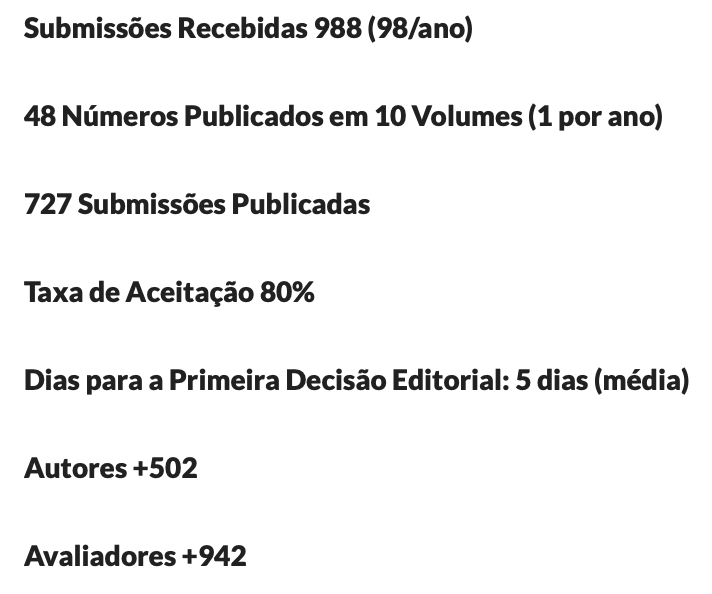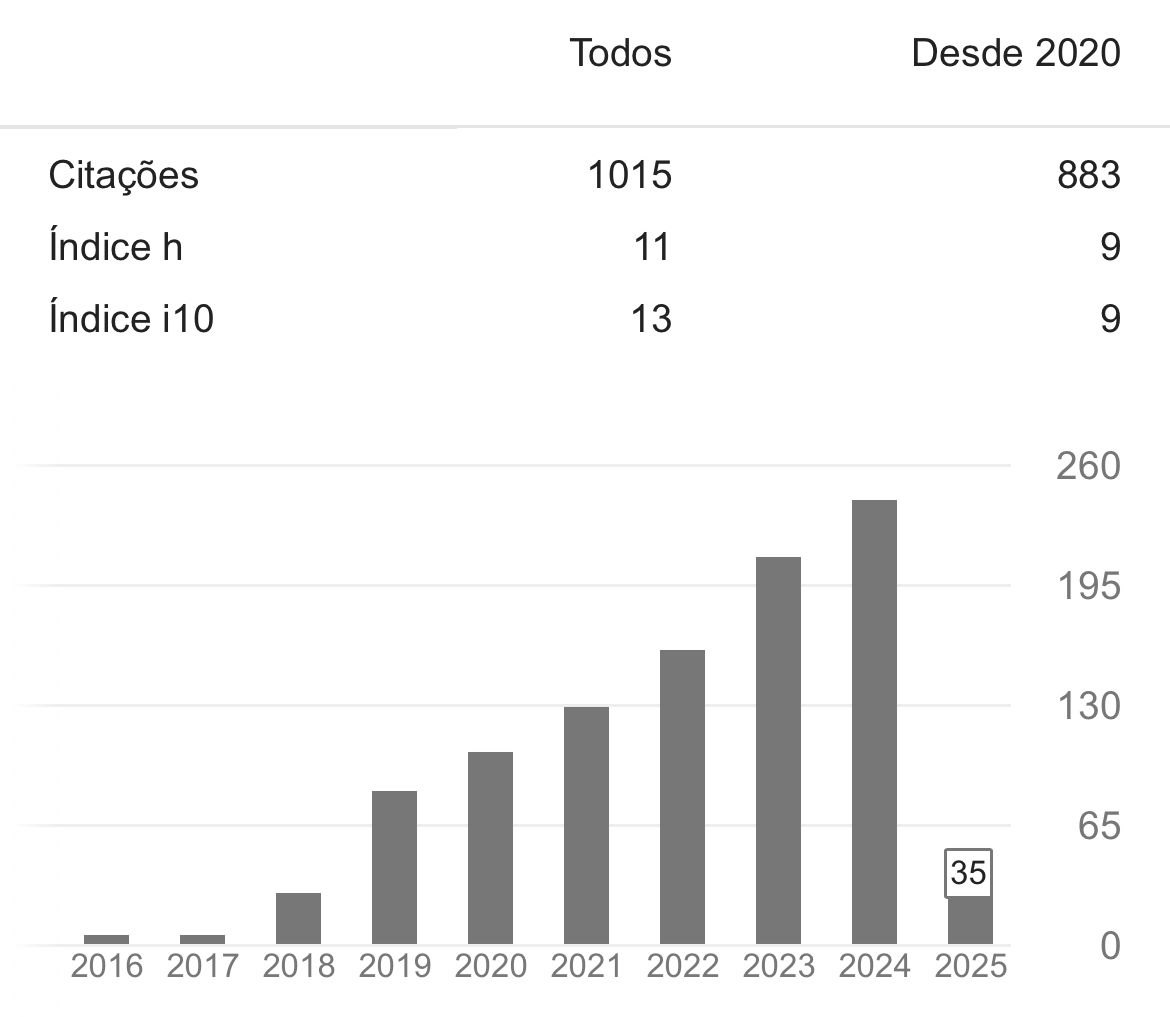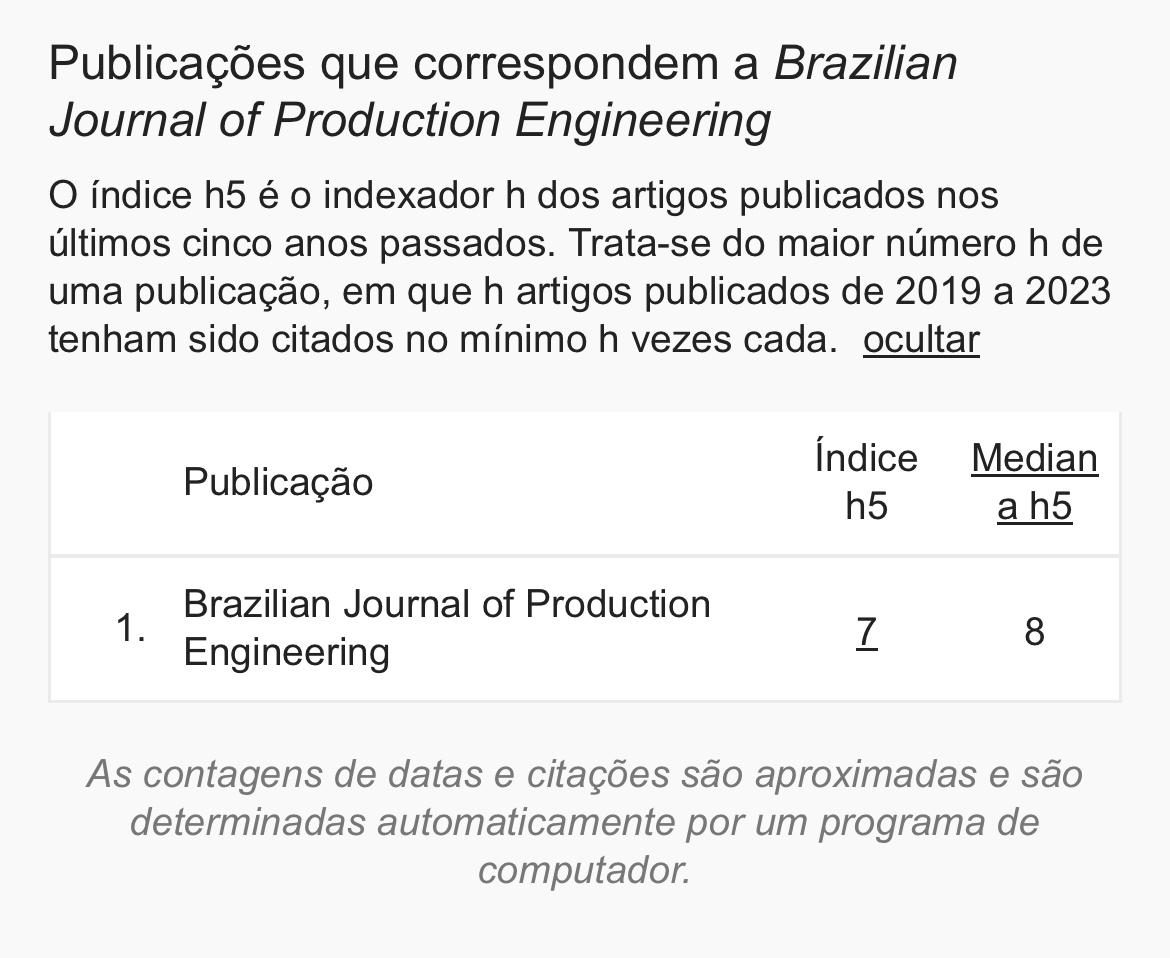Uso de tecnologías de la industria 4.0 en la seguridad y salud de los trabajadores: una revisión sistemática de la literatura
DOI:
https://doi.org/10.47456/bjpe.v7i5.37022Palabras clave:
Industria 4.0, Salud y seguridad, Ergonomía, Revisión sistemáticaResumen
Según datos del Observatorio Digital de Salud y Seguridad en el Trabajo, desde 2012, Brasil registró más de 17.000 muertes y 4,5 millones de accidentes de trabajo, siendo más frecuentes las bajas accidentales por accidentes (65%) que por enfermedad (35%). . Entendiendo el gran desafío que esto representa para la productividad, economía y calidad dentro de las corporaciones, existen enfoques que utilizan tecnologías de industria 4.0 para prevenir accidentes laborales. El objetivo de este trabajo fue realizar una revisión sistemática sobre el uso de las tecnologías de la Industria 4.0 aplicadas a la Seguridad y Salud en el Trabajo para la prevención de accidentes laborales. Se realizó una revisión sistemática de la literatura utilizando el Methodi Ordinatio, con inclusión de artículos científicos publicados en las bases de datos Science Direct, Scopus y Web of Science. Se utilizaron términos de búsqueda: “Industria 4.0”; "Salud ocupacional"; y seguridad"; utilizando el operador booleano AND. Se encontraron 99 documentos, 94 restantes después de la eliminación de artículos duplicados y 19 fueron seleccionados para su análisis y lectura exhaustiva. Las posibilidades de gestión ocupacional preventiva y simultánea mediante el uso de tecnologías de la industria 4.0 se consideraron prometedoras. La literatura refleja la importancia de las adaptaciones tecnológicas en la gestión de la Seguridad y Salud en el Trabajo en Brasil, con el fin de hacerla más propositiva, práctica, simultánea y eficiente.
Descargas
Citas
Adem, A., Çakit, E., & Dağdeviren, M. (2020). Occupational health and safety risk assessment in the domain of Industry 4.0. Applied Sciences, 2(977), 1-6. https://doi.org/10.1007/s42452-020-2817-x
Aslan, I. (2019). The Role of Industry 4.0 in Occupational Health and Safety. International European Congress On Social Sciences - IV, Diyarbakır, Turquia, p. 334–345. Recuperado de https://www.researchgate.net/publication/336699164
Badri, A., Boudreau-Trudel, B., & Souissi, A. S. (2018). Occupational health and safety in the industry 4.0 era: A cause for major concern? Safety Science, 109, 403–411. https://doi.org/10.1016/j.ssci.2018.06.012
Dhalmahapatra, K., Maiti, J., & Krishna, O. B. (2021). Assessment of virtual reality based safety training simulator for electric overhead crane operations. Safety Science. 139. https://doi.org/10.1016/j.ssci.2021.105241
Di Nardo, M., Madonna, M., Murino, T., & Castagna, F. (2020). Modelling a Safety Management System Using System Dynamics at the Bhopal Incident. Applied Science, 10(3), 903. https://doi.org/10.3390/app10030903
Filho, A. D. P. C. (2015). Uso de big data em saúde no Brasil: perspectivas para um futuro próximo. Epidemiologia e Serviços de Saúde. 24(2), 325-332. Recuperado de http://scielo.iec.gov.br/pdf/ess/v24n2/v24n2a15.pdf
Galvão, T. F., & Pereira, M. G. (2014). Revisões sistemáticas da literatura: passos para sua elaboração. Epidemiologia e Serviços de Saúde. 23(1), 183-184. Recuperado de http://scielo.iec.gov.br/pdf/ess/v23n1/v23n1a18.pdf
Goelzer, B. (2020, Setembro). Mudanças no mundo do trabalho e seus efeitos na SST. Revista Proteção, 11(347). Recuperado de https://protecao.com.br/eventos/mudancas-no-mundo-do-trabalho-e-seus-efeitos-na-sst-foi-tema-no-congresso-sst-2020/
Grabowski, A., Jankowski, J., & Wodzynski, M. (2021). Teleoperated mobile robot with two arms: the influence of a human-machine interface, VR training and operator age. International Journal of Human - Computer Studies. 156. https://doi.org/10.1016/j.ijhcs.2021.102707
Gregori, F., Papetti, A., Pandolfi, M., Peruzzini, M., & Germani, M. (2018). Improving a production site from a social point of view: an IoT infrastructure to monitor workers condition. Procedia CIRP, 72, 886–891. https://doi.org/10.1016/j.procir.2018.03.057
Gualtieri, L., Palomba, I., Merati, F. A., Rauch, E., & Vidoni, R. (2020a). Design of Human-Centered Collaborative Assembly Workstations for the Improvement of Operators’ Physical Ergonomics and Production Efficiency: A Case Study. Sustainability, 12(9). https://doi.org/10.3390/su12093606
Gualtieri, L., Rauch, E., Vidoni, R., & Matt, D. T. (2020b) Safety, ergonomics and efficiency in Human-Robot Collaborative Assembly: Desing Guidelines and Requirements. Procedia CIRP, 91, 367–372. https://doi.org/10.1016/j.procir.2020.02.188
Ippolito, D., Constantinescu, C., & Riedel, O. (2020) Holistic Planning and optimization of human-centred workplaces with integrated Exoskeleton technology. Procedia CIRP, 88, 214–217. https://doi.org/10.1016/j.procir.2020.05.038
Kang, Y., Yang, S., & Patterson, P. (2021). Modern Cause and Effect Model by Factors of Root Cause for Accident Prevention in Small to Medium Sized Enterprises. Safety and Health at Work. https://doi.org/10.1016/j.shaw.2021.08.002
Li, W., & Kara, S. (2017). Methodology for Monitoring Manufacturing Environment by Using Wireless Sensor Networks (WSN) and the Internet of Things (IoT). Procedia CIRP, 61, 323–328. https://doi.org/10.1016/j.procir.2016.11.182
Lohasiriwat, H., & Chaiwong, W. (2020) Ergonomic Design for Sausage Packing Hand Tool. Procedia CIRP. 91, 789-795. https://doi.org/10.1016/j.procir.2020.02.236
Lo Presti, D., Carnevale, A., D’Abbraccio, J., Massari, L., Massaroni, C., Sabbadini, R., Zaltieri, M., Di Tocco, J., Bravi, M., Miccinilli, S., Sterzi, S., Longo, U. G., Denaro, V., Caponero, M. A., Formica, D., Oddo, C. M., & Schena, E. (2020). A Multi-Parametric Wearable System to Monitor Neck Movements and Respiratory Frequency of Computer Workers. Sensors. 20(2), 536. https://doi.org/10.3390/s20020536
Massiris, F. M., Fernández, J. Á., Bajo, J. M., & Delrieux, C. A. (2020). Ergonomic risk assessment based on computer vision and machine learning. Computers & Industrial Engineering. https://doi.org/10.1016/j.cie.2020.106816
Nara, E. O. B., da Costa, M. B., Baierle, I. C., Schaefer, J. L., Benitez, G. B., do Santos, L. M. A. L., & Benitez, L. B. (2020). Expected Impact of Industry 4.0 Technologies on Sustainable Development: A study in the context of Brazil’s Plastic Industry. Sustainable Production and Consumption. https://doi.org/10.1016/j.spc.2020.07.018
Neiva, L. S., de Menezes, L. N., Lira, M. C. de A. & Brasileiro, M. I. (2020). Industry 4.0: concepts, challenges and expectations. Revista Brasileira de Engenharia de Produção - BJPE. 6(1), 1-10. Recuperado de https://periodicos.ufes.br/bjpe/article/view/28247
Pagani, R. N., Kovaleski, J., & Resende, L. M. (2015). Methodi Ordinatio: a proposed methodology to select and rank relevant scientific papers encompassing the impact factor, number of citations, and year of publication. Scientometrics, 105(3), 2109-2135. https://doi.org/10.1007/s11192-015-1744-x
Pagani, R., Kovaleski, J., & Resende, L. M. (2018). Avanços na composição da Methodi Ordinatio para revisão sistemática de literatura. Ciência da Informação. 46(2), 161-187. Recuperado de http://revista.ibict.br/ciinf/article/download/1886/3708/12368
Pauliková, A., Babeľová, Z. G., & Ubárová, M. (2021). Analysis of the Impact of Human–Cobot Collaborative Manufacturing Implementation on the Occupational Health and Safety and the Quality Requirements. International Journal of Environmental Research and Public Health, 18(4), 1927. https://doi.org/10.3390/ijerph18041927
Peixoto, N. E. S., Pereira-filho, M. M., & Farias, J. S. (2021). Panorama da Produção Empírica Internacional de Inovação em Serviços Turísticos entre 2008 e 2020: Uma Revisão Sistemática da Literatura. Revista Eletrônica de Negócios Internacionais. 16(1), 56-74. Recuperado de https://internext.espm.br/internext/article/view/596
Petz, P., Eibensteiner, F., & Langer, J. (2021). Sensor Shirt as Universal Platform for Real-Time Monitoring of Posture and Movements for Occupational Health and Ergonomics. Procedia Computer Science, 180, 200–207. https://doi.org.10.1016/j.procs.2021.01.157
Pontarolo, M. L. (2018). Relação entre segurança do trabalho e produtividade: uma revisão sistemática. (Trabalho de conclusão de curso de especialização). Universidade Tecnológica Federal do Paraná, Ponta Grossa, PR, Brasil. Recuperado de https://repositorio.utfpr.edu.br/jspui/bitstream/1/23382/1/relacaosegurancatrabalhoprodutividade.pdf
Rey, R. O., de Melo, R. R. S., & Costa, D. B. (2021). Design and implementation of a computerized safety inspection system for construction sites using UAS and digital checklists – Smart Inspecs. Safety Science, 143. https://doi.org/10.1016/j.ssci.2021.105430
Rolim, N. R. F., Gabriel, I. de S., Mota, A. S., & de Quental, O. B. (2020) Fatores que contribuem para a classificação da gestação de alto risco: revisão integrativa. Revista Brasileira de Engenharia de Produção - BJPE. 6(6), 60-68. Recuperado de https://periodicos.ufes.br/bjpe/article/view/31055
Scafa, M., Papetti, A., Brunzini, A., & Germani, M. (2019). How to improve worker’s well-being and company performance: a method to identify effective corrective actions. Procedia CIRP, 81, 162–167. https://doi.org/10.1016/j.procir.2019.03.029
Sima, V., Gheorghe, I. G., Subic, J., & Nancu, D. (2020). Influences of the Industry 4.0 Revolution on the Human Capital Development and Consumer Behavior: A Systematic Review. Sustainability, 12(10), 1-28. https://doi.org/10.3390/su12104035
Steinhilber, B., Seibt, R., Rieger, M. A., & Luger, T. (2020). Postural Control When Using an Industrial Lower Limb Exoskeleton: Impact of Reaching for a Working Tool and External Perturbation. Human Factors: The Journal of the Human Factors and Ergonomics Society. https://doi.org/10.1177/0018720820957466
Sumer B (2018) Impact of Industry 4.0 on occupations and employment in Turkey. European Scientific Journal, 14(10), 1-17. https://doi.org/10.19044/esj.2018.v14n10p1
Teixeira, R. L. P., Teixeira, C. H. S. B., Brito, M. L. de A., & Silva, P. C. D. (2019) Os discursos sobre os desafios da siderurgia na indústria 4.0 no Brasil. Brazilian Journal of Development. 5(12), 28290-28309. Recuperado de https://www.brazilianjournals.com/index.php/BRJD/article/view/5094
Tessarini, G. & Saltorato, P. (2018). Impactos da Indústria 4.0 na Organização do Trabalho: Uma Revisão Sistemática da Literatura. Revista Produção Online. 18(2), 743-769. https://doi.org/10.14488/1676-1901.v18i2.2967
Turk, M., Resman, M., & Herakovic, N. (2021). The impact of smart technologies: A case study on the efficiency of the manual assembly process. Procedia CIRP. 97, 412-417. https://doi.org/10.1016/j.procir.2020.05.260
Vukicevic, A. M., Djapan, M., Stefanovic, M., & Macuzic, I. (2019). SafE-Tag mobile: A novel javascript framework for real-time management of unsafe conditions and unsafe acts in SMEs. Safety Science, 120, 507-516. https://doi.org/10.1016/j.ssci.2019.07.024
Descargas
Publicado
Cómo citar
Número
Sección
Licencia
Derechos de autor 2021 Brazilian Journal of Production Engineering - BJPE

Esta obra está bajo una licencia internacional Creative Commons Atribución-NoComercial-CompartirIgual 4.0.

















































































